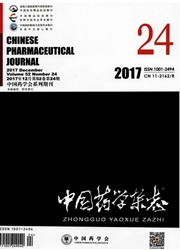

 中文摘要:
中文摘要:
目的研究氧化苦参碱对大鼠急性缺血性心肌细胞凋亡的影响及其机制。方法以结扎左冠状动脉前降支方法建立大鼠急性心肌缺血模型,缺血6h后分别测定心肌梗死范围,血清超氧化物歧化酶(SOD)活力和丙二醛(MDA)含量;采用HE染色检测心肌组织病理学改变;分别采用原位末端脱氧核糖核酸转移酶介导的d-UTP缺口末端标记(TUNEL)法及SP免疫组织化学法检测心肌细胞凋亡指数,凋亡相关蛋白Fas/FasL和Bcl.2的表达情况。结果氧化苦参碱能缩小大鼠缺血心肌梗死范围,提高血清SOD活力,降低MDA含量,减轻心肌组织病理性损伤,降低心肌细胞凋亡指数,抑制Fas蛋白表达,增强Bcl-2蛋白表达,但对FasL蛋白表达无明显影响。结论氧化苦参碱对大鼠急性心肌缺血损伤保护作用的机制可能与其抗脂质过氧化作用,抑制Fas蛋白和增强Bcl-2蛋白表达从而抑制心肌细胞凋亡有关。
 英文摘要:
英文摘要:
OBJECTIVE To investigate the protective effects of oxymatrine on myocyte apoptosis induced by acute myocardial ischaemia in rats and to explore its possible mechanism. METHODS Rat myocardial ischaemia model was induced by ligating the anterior descending branch of left coronary artery. At six hours after ischaemia, the activity of superoxide dismutase (SOD) and the content of malondialdehyde (MDA) were determined to confirm the degree of injury, histopathological changes in myocardium was observed, apoptotic cells were detected using the terminal deoxynucleotidyl transferase-mediated d-UTP nick end labeling (TUNEL) methods, the expressions of Fas/FasL and Bcl-2 were studied by SP immunohistochemical method. RESULTS Oxymatrine reduced the size of myocardial infarct, increased SOD activity and reduced MDA products in serum. Oxymatrine reduced the pathological injury of myocardium, decreased apoptosis index and the myocardial expression of Fas protein, increased the expression of Bcl-2 protein, whereas the expression of FasL protein was not affected. CONCLUSION Oxymatrine has protective effects on acute myocardial ischaemia in rats. These effects may be related to decreasing oxygen free radical, decreasing the myocardial expression of Fas protein and increasing the expression of Bcl-2 protein.
 同期刊论文项目
同期刊论文项目
 同项目期刊论文
同项目期刊论文
 The muscle-specific microRNAs miR-1 and miR-133 produce opposing effects on apoptosis by targeting H
The muscle-specific microRNAs miR-1 and miR-133 produce opposing effects on apoptosis by targeting H Cardioprotective Effects and Underlying Mechanisms of Oxymatrine Against Ischemic Myocardial Injurie
Cardioprotective Effects and Underlying Mechanisms of Oxymatrine Against Ischemic Myocardial Injurie JAK/STAT and PI3K/AKT Pathways Form A Mutual Transactivation Loop and Afford Resistance to Oxidative
JAK/STAT and PI3K/AKT Pathways Form A Mutual Transactivation Loop and Afford Resistance to Oxidative Indapamide induces apoptosis of GH3 pituitary cells independently of its inhibition of voltage-depen
Indapamide induces apoptosis of GH3 pituitary cells independently of its inhibition of voltage-depen Sphingolipid Metabolite Ceramide Causes Metabolic Perturbation Contributing to HERG K+ Channel Dysfu
Sphingolipid Metabolite Ceramide Causes Metabolic Perturbation Contributing to HERG K+ Channel Dysfu Large-conductance Ca2+-activated K+ currents blocke and impaired by homocysteine in human and rat me
Large-conductance Ca2+-activated K+ currents blocke and impaired by homocysteine in human and rat me Volume-sensitive outwardly rectifying chloride channels are involved in oxidative stress-induced apo
Volume-sensitive outwardly rectifying chloride channels are involved in oxidative stress-induced apo Increasing Intracellular calcium of guinea pig ventricular myocytes induced by platelet activating f
Increasing Intracellular calcium of guinea pig ventricular myocytes induced by platelet activating f 期刊信息
期刊信息
